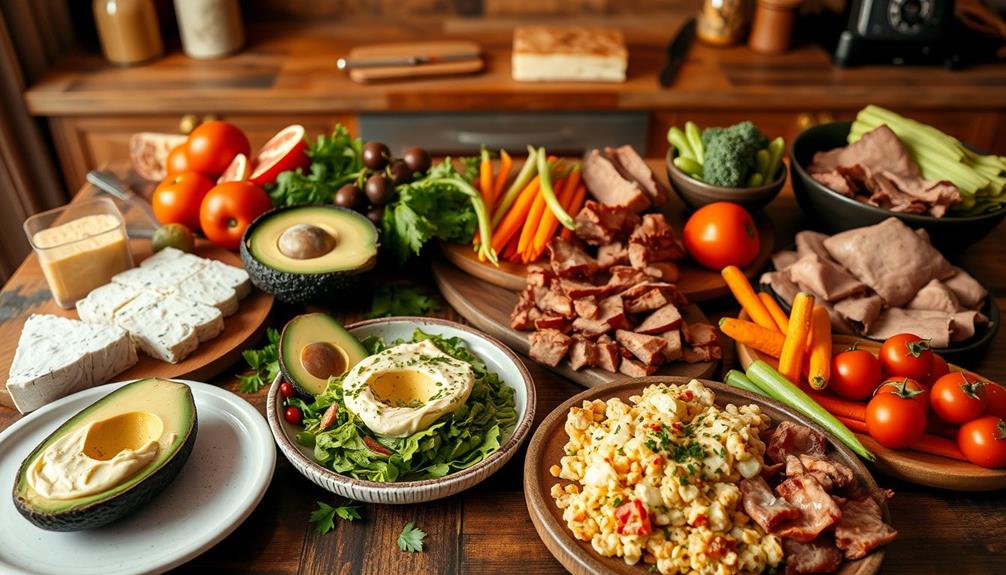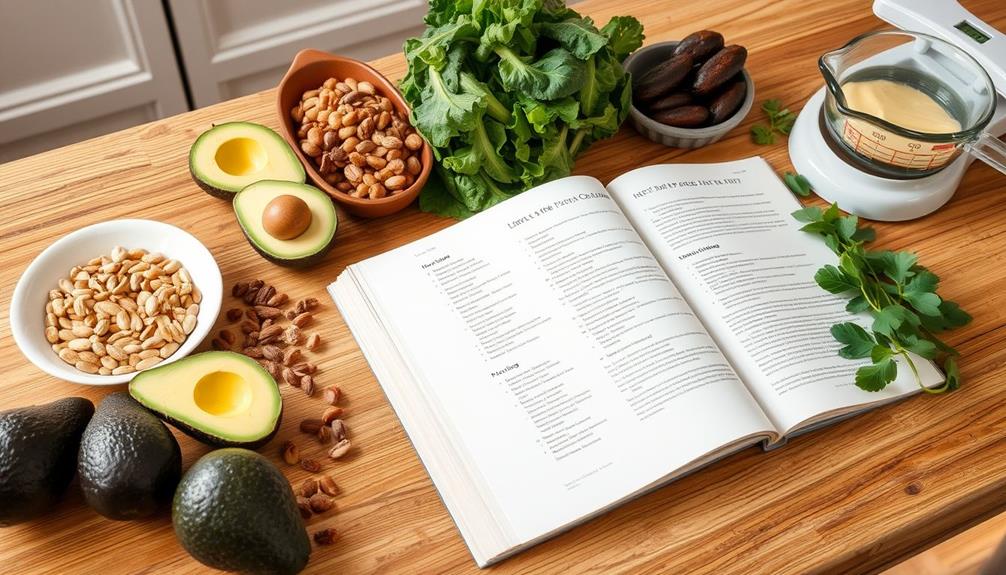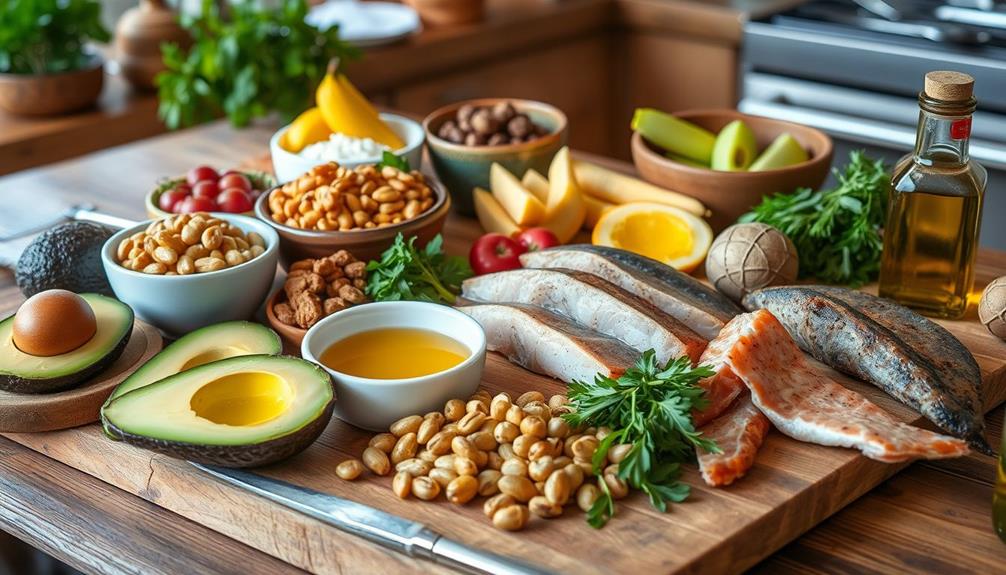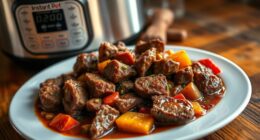To gain weight on a keto diet, focus on increasing your caloric intake by 300-500 calories daily. You'll want to consume high-fat foods like avocados, fatty meats, and full-fat dairy, aiming for a macronutrient ratio of about 60% fats, 30% protein, and 10% carbohydrates. Spreading your meals into 3-6 smaller servings helps. Incorporating strength training will also support muscle growth. Avoid high-carb snacks and sugary drinks, as they can disrupt your progress. By following these guidelines, you can successfully increase your weight while on keto, and there's plenty more to explore on optimizing your diet for results.
Key Takeaways
- Create a daily caloric surplus of 300-500 calories by incorporating nutrient-dense, high-fat foods like avocados and fatty meats.
- Maintain a macronutrient ratio of approximately 60% fats, 30% protein, and 10% carbohydrates to support weight gain on keto.
- Consume around 1 gram of protein per pound of body weight, focusing on fatty meats, eggs, and full-fat dairy.
- Incorporate strength training 2-3 times weekly, emphasizing compound exercises to build muscle effectively.
- Include healthy snacks like nuts and cheese between meals to boost caloric intake without exceeding carb limits.
Understanding Weight Gain on Keto
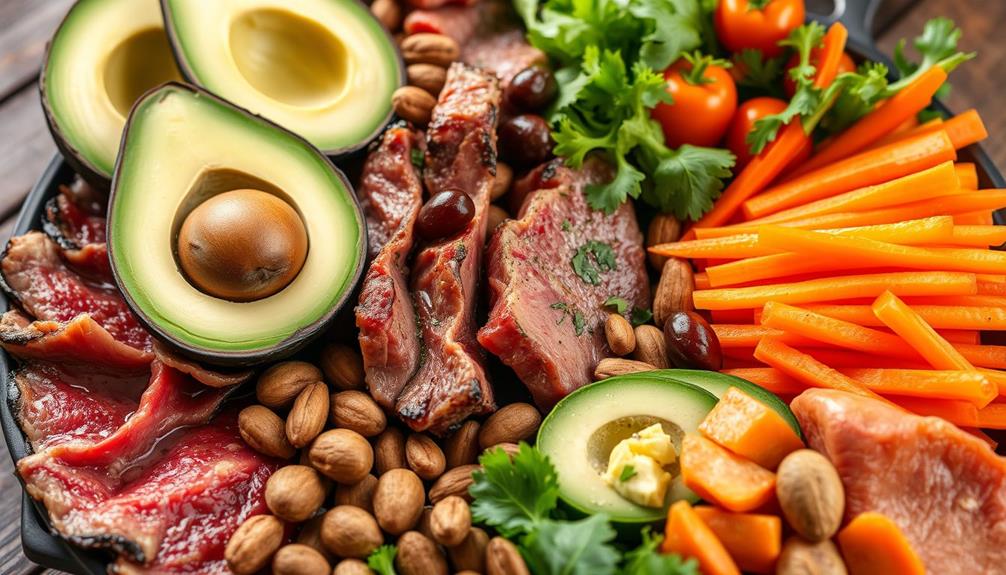
Gaining weight on a keto diet isn't just about eating more; it requires a strategic approach to your caloric intake and macronutrient balance. To achieve healthy weight gain, you'll need to create a caloric surplus, typically increasing your intake by 300-500 calories daily. This guarantees your body has the extra energy it needs for building muscle and supporting overall health.
It's crucial to recognize that certain foods, such as avocados and fatty meats, provide not only calories but also essential nutrients that support overall health and wellness, including antioxidant-rich options.
On a ketogenic diet, aim for a macronutrient ratio of about 60% healthy fats, 30% protein, and 10% carbohydrates. This composition allows you to maintain ketosis while promoting muscle mass. Focus on incorporating high-calorie foods like fatty meats, avocados, and full-fat dairy to meet your caloric goals without exceeding carb limits.
Strength training plays an essential role in your weight gain journey. Engaging in regular strength training exercises, particularly compound movements, helps stimulate muscle growth.
Additionally, consider eating more frequently—3-6 meals a day—to enhance your caloric intake and avoid the downsides of intermittent fasting. With the right approach to protein intake and a commitment to building muscle, you can effectively achieve your weight gain goals on a ketogenic diet.
Key Nutrients for Weight Gain

When you're aiming to gain weight on a keto diet, focusing on key nutrients is imperative for success. Prioritizing the right macronutrients can help you reach your caloric intake goals while adhering to keto guidelines.
To enhance your approach, contemplate incorporating effective strategies for weight loss that align well with your weight gain objectives. Here are some essential components to reflect upon:
- Healthy Fats: Aim for about 60% of your daily caloric intake from sources like avocados and olive oil. This provides energy and supports weight gain.
- Protein: Incorporate around 1 gram of protein per pound of body weight to promote muscle gain and repair, which is critical on a keto diet.
- Nutrient-Dense Foods: Include fatty fish and full-fat dairy to guarantee you get omega-3 fatty acids and calcium for overall health and muscle function.
Don't forget to consume low-carb vegetables to keep your net carbohydrates under 50 grams daily, helping maintain ketosis while achieving a caloric surplus.
Additionally, adding high-calorie snacks like nuts and cheese can greatly boost your caloric intake without disrupting your low-carb lifestyle.
Foods to Include in Your Diet
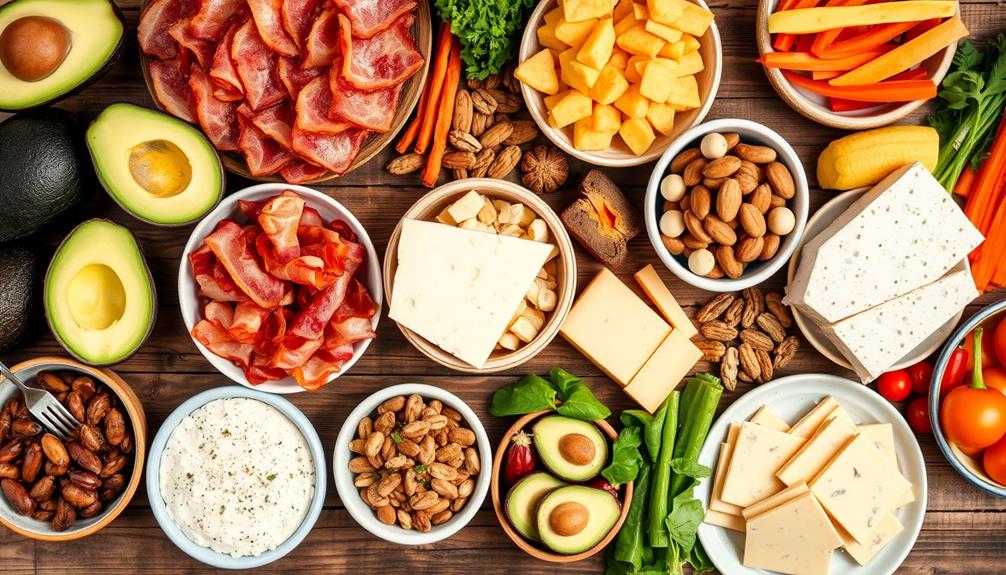
To successfully gain weight on a keto diet, it's important to choose the right foods that align with your nutritional goals. Start by incorporating fatty fish like salmon and mackerel into your meals. Not only are these fish rich in protein, but they also provide essential omega-3 fatty acids and are calorie-dense, which helps with weight gain while keeping carbs low.
Additionally, understanding the differences between various food sources can enhance your meal planning, especially when aiming for a balanced diet that supports your goals various brewing methods.
Avocados should be a staple as well. With around 240 calories and 22 grams of fat per avocado, they offer a fantastic source of healthy fats. Full-fat dairy products, like Greek yogurt and cheese, add both calories and protein, necessary for muscle growth.
Don't forget nutrient-dense meats such as chicken thighs, fatty cuts of beef, and pork belly. These options are packed with protein and healthy fats that support a caloric surplus, essential for weight gain.
To balance your diet, include low-carb vegetables like spinach, broccoli, and zucchini. They provide fiber and important vitamins without greatly raising your carb intake, supporting your overall health on a ketogenic diet.
Foods to Avoid for Success
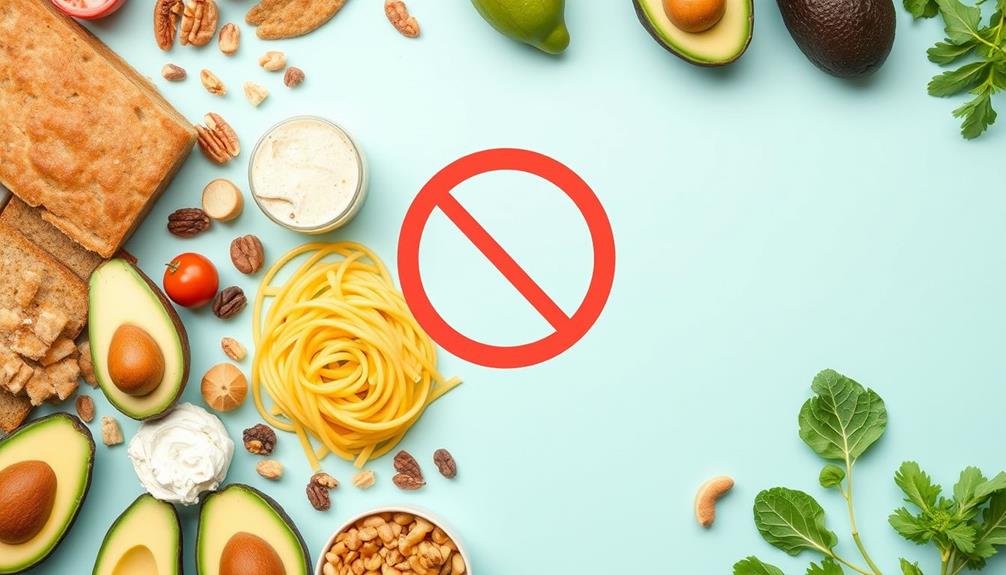
To succeed on a keto diet, you'll need to avoid high-carb foods that can throw you out of ketosis. This means steering clear of processed snacks and sugary drinks that may seem tempting but can sabotage your weight gain efforts.
Additionally, focusing on a balanced diet with low-carb vegetables can support your overall health and enhance your weight gain on keto. By prioritizing these choices, you'll be better equipped to manage your carb intake effectively and maximize your results.
natural remedies alongside conventional medications can also play a role in your dietary strategy.
High-Carb Foods
Maneuvering the keto diet means steering clear of high-carb foods that can sabotage your efforts. To maintain ketosis and support weight gain, it's crucial to avoid certain foods that disrupt your metabolic state. High-carb foods can quickly derail your progress, so keep an eye on your calorie intake and stick to healthy fats.
Understanding your credit score can be akin to tracking your diet; both require monitoring to guarantee you stay on the right path to achieve your goals.
Here are some high-carb foods to avoid:
- Grains like rice and pasta
- High-sugar fruits such as bananas and grapes
- Starchy vegetables, including potatoes and corn
Processed foods often contain hidden sugars and unhealthy carbs, making them a poor choice on your keto journey. You should also monitor your protein intake, especially from high-carb sources like legumes. This helps guarantee you remain in ketosis, which is crucial for effective weight gain.
Lastly, replace high-sugar sauces and condiments with savory, low-carb alternatives. By avoiding these high-carb foods, you'll create a supportive environment for weight gain while adhering to keto guidelines.
Stay focused on your goals, and enjoy the benefits of a successful keto diet!
Processed Food Products
When maneuvering your keto journey, it's essential to steer clear of processed food products that can hinder your weight gain efforts. Many processed foods are loaded with hidden sugars and high-carb ingredients, disrupting your carbohydrate intake and keeping you from maintaining ketosis.
This can be particularly detrimental if you're trying to gain weight healthily on keto, especially if you have underlying psychological conditions such as Borderline Personality Disorder (BPD), which may influence emotional eating patterns.
Snacks like chips and granola bars often lack the healthy fats needed for your body composition goals, while ready-made meals and sauces frequently contain preservatives and added sugars. These not only increase your calorie intake but also compromise your metabolic goals.
Products labeled as "low-fat" might seem appealing, but they often contain fillers that counteract your high-fat ketogenic diet.
Moreover, consuming processed foods can lead to inflammation and digestive issues, further complicating your overall health and weight gain progress.
To succeed on your keto diet, focus on whole, nutrient-dense keto foods rich in healthy fats, and you'll be better equipped to reach your weight gain goals without the pitfalls of processed foods.
Sugary Snacks and Drinks
Sugary snacks and drinks can sabotage your keto weight gain efforts faster than you might think. These foods are often high in carbohydrates and can greatly disrupt your progress. To stay on track, avoid:
- Candy bars and cookies
- Sodas and sweetened juices
- Granola bars with hidden sugars
In fact, many women may not realize that certain dietary choices can impact their health, including their risk for conditions like breast cancer, which can be influenced by diet and lifestyle choices mammography guidelines.
Sugary snacks and drinks not only push your carb intake overboard but also prevent you from reaching your weight gain goals. Those seemingly healthy granola bars may contain added sugars and starches that ruin your low-carb lifestyle. Desserts, like cakes and pastries, lead to insulin spikes, hindering your body's ability to use fat for energy.
Reading food labels is essential; many products claim to be "low-carb" but can contain hidden added sugars that interfere with achieving a caloric surplus.
Practical Tips for Effective Weight Gain

To effectively gain weight on a keto diet, focus on increasing your caloric intake with nutrient-dense, high-calorie foods. Incorporating healthy fats like avocados, nuts, and fatty meats can also enhance your overall well-being, similar to how essential oils can support health, including essential oils for respiratory health.
Aim to add 300-500 calories daily. These foods not only boost your calorie intake but also keep you in ketosis.
Make sure you're consuming about 1 gram of protein per pound of body weight, which supports muscle growth while keeping net carbohydrates under 50 grams per day. Spread your meals into 3-6 smaller servings, including nutrient-dense snacks like boiled eggs and cream cheese with veggies, to enhance your overall caloric intake without jeopardizing your diet.
Engage in strength training 2-3 times a week, concentrating on compound exercises that build lean muscle mass and encourage weight gain. Regularly track your calories to monitor your progress. Use food-tracking apps or journals for better accountability and adjust your intake based on your results.
Building Muscle on a Keto Diet

Building muscle on a keto diet requires a strategic approach that combines strength training with a well-structured nutrition plan. To effectively help you gain weight while building muscle, focus on these key components:
- Engage in heavy lifting: Prioritize compound lifts like squats and deadlifts to stimulate multiple muscle groups. Incorporating resistance training can also enhance your overall fitness and well-being, as seen in yoga for back pain, which highlights the importance of strength and flexibility in managing physical strain.
- Prioritize protein and healthy fats: Aim for 1 gram of protein per pound of body weight from sources like fatty cuts of meat, eggs, and full-fat dairy, while incorporating healthy fats such as avocados and olive oil.
- Implement progressive overload: Gradually increase the weights you lift to continually challenge your muscles.
In addition to these strategies, maintaining a caloric surplus is essential for muscle growth. Staying hydrated and ensuring electrolyte balance will support muscle function and recovery during your resistance training sessions.
Frequently Asked Questions
Can a Skinny Person Gain Weight on Keto?
Yes, you can gain weight on keto. Focus on high-fat, low-carb foods, increase your caloric intake, and make sure you're eating enough protein. Incorporate strength training and frequent meals to support muscle growth and steady weight gain.
How Do I Stop Losing Weight on Keto?
To stop losing weight on keto, increase your calorie intake with high-fat foods, eat more frequently, and monitor your protein. Incorporate strength training to build muscle and track your macronutrient ratios for better results.
What Keto Foods Are Good for Weight Gain?
To gain weight on keto, focus on calorie-dense foods. Incorporate fatty fish, avocados, full-fat dairy, nuts, and fatty meats. You'll boost your caloric intake while enjoying delicious, low-carb options that support your goals.
How to Bulk on Keto?
To bulk on keto, focus on a caloric surplus, eating high-fat, low-carb foods. Incorporate healthy fats and protein, increase meal frequency, and lift weights regularly to maximize muscle gain while adhering to your dietary plan.
Conclusion
In your quest for weight gain on a keto diet, remember to prioritize protein-packed plates and healthy fats. By focusing on filling foods, fabulous fats, and frequent meals, you'll foster fantastic growth. Stay consistent, track your intake, and don't shy away from strength training to sculpt your physique. With determination and diligence, you can turn your keto journey into a successful story of strength and size. Embrace the challenge, and watch your body transform beautifully!
